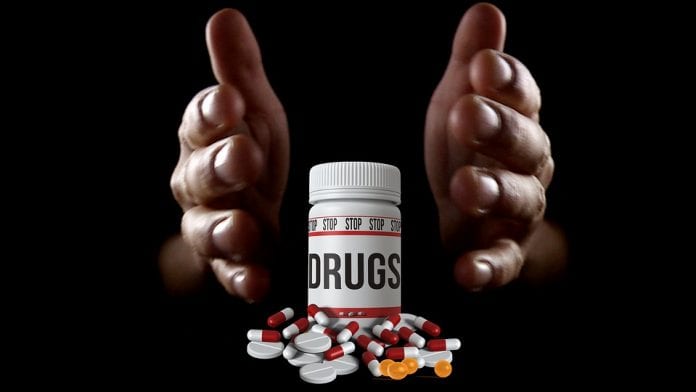1 in 3 drug deaths by overdose that occur in Europe happen in the UK
According to a major new report launched today the UK is in the midst of an addiction crisis and calls on the government to act now to save the future of millions of young lives. Today, the UK accounts for about twice the number of drug overdose deaths than Germany, which has the second highest number.
It reveals that, according to FOI responses, while drug related death rates soar across the UK, nearly one in five local authorities have cut addiction treatment budgets by over a third and that some have slashed their budget by over 50%.
The report, Road to Recovery, from the Centre for Social Justice, criticises the Government for failing to fulfil its pledge to ensure addiction services are ‘effectively funded’ so that ‘no one should be left behind on the road to recovery’.
This comes at a time when the total societal cost of drug and alcohol addiction is conservatively estimated by the think tank to be £38 billion – or roughly two per cent of GDP – the same as the entire defence budget.
Alcohol misuse alone costs the NHS around £3.5bn a year.
It follows the release of new ONS figures that show drug deaths are at their highest levels since records began; including cocaine related deaths doubling in the last three years.
The report highlights the extent of the havoc wrought by all forms of addiction in the UK and the challenges that are faced across the country. Major examples include:
- Drug misuse kills more people in the UK every year than knife crime and road traffic deaths combined
- Cocaine related deaths have risen for the sixth consecutive year.
- NHS admissions related to alcohol are 15 per cent higher than 2007
- There were just under 7,700 alcohol specific deaths in 2017
- There are 55,000 children in the UK believed to be problem gamblers, some aged as young as 11
- According to the Citizens Advice Bureau a third of families with children affected by gambling-related harm, can’t afford essential costs such as food, rent and household bills as a result of a family member’s gambling
Within the report are human stories that illustrate the difficulties caused by addiction but also the inspiring changes that can happen with support. One example is the fight that Louis, a veteran of the NI conflict, had with addiction and homelessness. His story demonstrates how vital connection is to recovery from addiction and how much can be achieved.
The report argues that the current neglect of the treatment sector has led to social harm that will last for more than a generation.
It calls for an overhaul of existing addiction treatment structures and the creation of a new agency within the Cabinet Office – the Prevention and Recovery Agency (PRA). This would help create the robust, flexible and reactive recovery sector that will equip the UK to deal with the very real threat posed by addiction. Allowing a solution which truly brings together housing, health, education and employment to help a people in their recovery – understanding that the solution lies not in a focus on the poison but on the person.
The new agency would be responsible for funding decisions and would ensure essential service needs do not go unmet and will ensure that the strategy is being implemented across England.
The PRA would secure the allocation of sufficient resources required by front line service providers for an effective fight against addiction. The PRA will also oversee increased emphasis on research, upskilling the work force, and capacity building by, for example, regaining lost residential rehabilitation facilities.
The paper states that only reform can ensure we reverse this tragic and costly trend and it challenges government to make this commitment. The paper also recommends other potential options to fund this agency:
- A new treatment tax on alcohol – something that is eminently possible as alcohol is now 188 per cent more affordable in supermarkets than it was 30 years ago
- Immediate employment of the provisions set out in s.123 of the 2005 Gambling Act – this would allow the introduction of a levy on all gambling operators
- Changing how the funds attained from proceeds of crime are distributed – the report calls for more of the retrievable funds to be reallocated to the treatment of addiction.
Andy Cook, Chief Executive of the CSJ, said:
“There has been a clear and worrying correlation between the recent reductions in addiction funding and the increase in drug-related deaths.
“Recovery is earned through an enormous test of character and emotional determination. We should be doing all we can to support those going through this process.
“It is a dereliction of duty that we have rehabilitation centres turning away those in need due to a lack of funding.
“The Government needs to fulfil its pledge and reverse these sharply deteriorating trends. It must regain lost rehabilitation capacity.
“We need a genuinely multi-departmental approach to recovery through every layer of government that will ensure that we can effectively combat addiction and help those in need of our help into recovery.”
ENDS
ABOUT THE CENTRE FOR SOCIAL JUSTICE
Established in 2004, the Centre for Social Justice (CSJ) is an independent think tank that studies the root causes of Britain’s social problems and seeks to address these through innovative policy recommendations to government.
The CSJ has changed the landscape of the political conversation by putting social justice at the heart of British politics. This has led to some of the biggest welfare reforms in a generation.
The majority of the CSJ’s work is organised around five ‘pathways to poverty’, first identified in the ground-breaking 2007 report, Breakthrough Britain. These are: family breakdown; educational failure; economic dependency and worklessness; addiction to drugs and alcohol; and severe personal debt.
CSJ research is informed by experts and, just as importantly, the CSJ Alliance – a unique group of charities, social enterprises and other grass-roots organisations that work with individuals facing some of the most challenging and complex social problems. Their work is fundamental to understanding the issues faced by the poorest communities.

| [donate]
| Help keep news FREE for our readersSupporting your local community newspaper/online news outlet is crucial now more than ever. If you believe in independent journalism,then consider making a valuable contribution by making a one-time or monthly donation. We operate in rural areas where providing unbiased news can be challenging. |



















